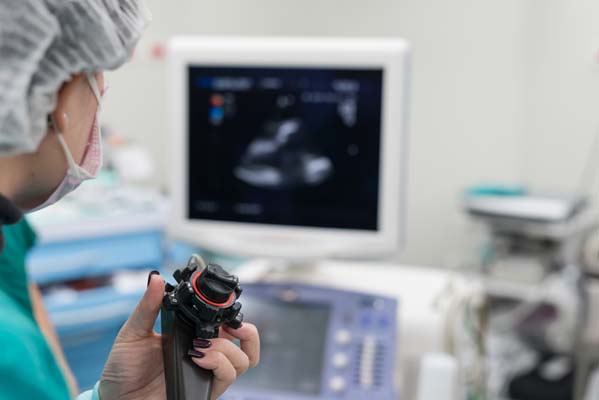What Does an Echocardiogram Test For

An echocardiogram uses sound waves to gather and evaluate information about a person's heart. Cardiologists often use echocardiograms when they need more information about your heart's size, shape, and function. They may also need it if you are experiencing chest pain or shortness of breath. Continue reading below to learn about echocardiograms and why healthcare providers use them to gather important information about the human heart.
What is an echocardiogram?
An echocardiogram is a type of non-invasive medical test that uses ultrasound technology to create images of the heart. It is used to evaluate the patient's heart's structure and function. An echocardiogram can also help cardiologists diagnose a variety of heart-related conditions, such as:
- Abnormal heart valves
- Congenital heart defects or disease
- Heart damage after a heart attack
- Heart failure
- Heart murmurs
- Infection, inflammation, or fluid in the sac around the heart
- Locating the source of a blood clot following a stroke
In addition, some patients may need an echocardiogram if they are experiencing symptoms related to their heart, such as chest pain or shortness of breath. They may also need this medical test to manage a previous heart condition, its progress, and the effectiveness of their treatment.
Types of echocardiograms
There are several types of echocardiograms. The type of echocardiogram the patient receives depends on their symptoms and medical history. A cardiologist will likely recommend an echocardiogram to reveal potential heart problems. The following includes the most common types of echocardiograms and the testing process.
- Transthoracic echocardiography (TTE). TTE is the most common type of echocardiogram. A technician applies gel to the patient's chest. They then use a small transducer to create images of the heart's structures and functions.
- Transesophageal echocardiography (TEE). During a TEE echocardiogram, a small, flexible tube with an ultrasound probe passes through a patient's mouth and down the esophagus. This type of echocardiogram is recommended for patients who struggle with obesity and lung disease. The patient is sedated during this procedure.
- Stress echocardiogram. This test helps cardiologists evaluate how a patient's heart responds to stress, such as exercise or medication. The test can lead to a diagnosis of a heart condition that may only occur due to exertion.
- 3D echocardiogram. A 3D echocardiogram creates a 3D image of the heart to provide an in-depth view of its structure and function. It is often the most common test for patients with congenital heart conditions and abnormalities.
- Contrast echocardiogram. In this procedure, the patient is given a special dye to enhance the images of the heart's inner chambers. Contrast echocardiograms allow for a more accurate diagnosis of conditions that affect the heart valves.
How to prepare for an echocardiogram
While an echocardiogram is a simple and non-invasive procedure, there are some things that the patient has to do to prepare. Depending on the type of echocardiogram they need and their cardiologist's recommendation, the patient may need to fast prior to the test to avoid affecting the images of their heart. Generally, the patient will need to remove jewelry or other objects that may interfere with the testing process. It may be an outpatient procedure or part of a hospital stay.
Do you need an echocardiogram?
If you have been experiencing heart issues due to a congenital condition or need an update on your treatment for heart disease. In that case, it may be time to make an appointment for an echocardiogram. We can help. Our experienced cardiologists can use this non-invasive testing procedure to evaluate how your heart is doing and come up with a specialized treatment plan. Reach out to our office today to make an appointment and relieve your worry.
Florida Premier Cardiology offers echocardiograms in the Delray Beach area. To learn more about our cardiology services, visit https://floridapremiercardio.com or call our office at (561) 325-6495 to make an appointment.
Check out what others are saying about our services on Yelp: Read our Yelp reviews.
Recent Posts
Leg spider vein treatment is a popular solution for those wanting to address unsightly or uncomfortable veins on the legs. These small, web-like clusters of veins are often red, blue, or purple and are typically harmless but can cause cosmetic concerns or discomfort. Leg spider vein treatment from a cardiologist can help reduce or eliminate…
A cardiologist provides essential care for those experiencing chest pain, helping to identify, diagnose, and manage conditions related to the heart and blood vessels. Although chest pain may feel alarming, not all causes relate to the heart. A thorough evaluation by a cardiologist ensures diagnosis and appropriate treatment, which is vital for both peace of…
Heart disease is one of the leading causes of death worldwide. A coronary stent is a small, metal mesh tube that is placed into narrowed or blocked coronary arteries to restore proper blood flow. This medical device can help prevent heart attacks and reduce the symptoms of coronary artery disease. By keeping the arteries open…
When symptoms of cardiovascular disease arise, seeking timely medical intervention can make a significant difference. Angioplasty is a procedure designed to restore blood flow in blocked or narrowed arteries, helping to prevent serious complications such as heart attacks. Understanding the reasons why a cardiologist may recommend this procedure can provide clarity and confidence when making…


